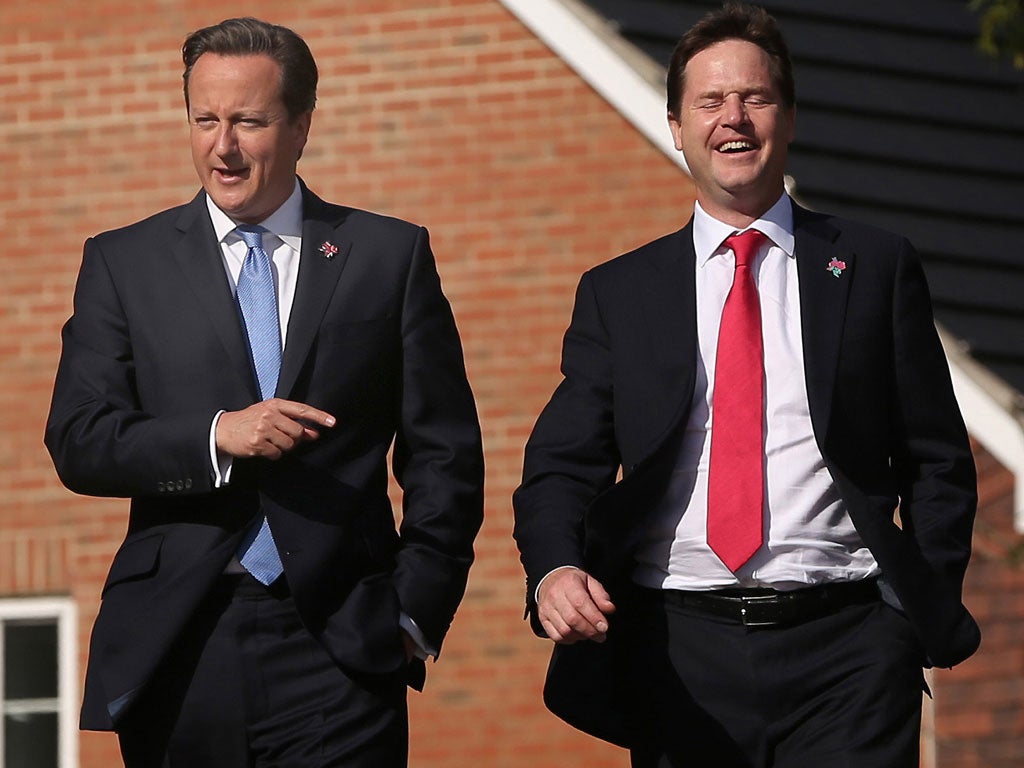Cameron and Clegg plan for post-2015 government
A coalition 2.0 document being drawn up between top Tories and Lib Dems talks of 'horizon-shift'

David Cameron and Nick Clegg are to sign a new coalition agreement in an attempt to heal the rift between Tories and Lib Dems over House of Lords reform and to bind the two parties together until the 2015 election, The Independent on Sunday has learned.
The Coalition 2.0 document, which will be published in November or December, will contain new policies on pensions and social care, as well as a progress report on measures in the original coalition agreement of May 2010.
The document had been put on the back burner for several months amid concerns inside No 10 that it would contain nothing new and during a period of heightened tensions between the two parties over Lords reform and Mr Clegg's subsequent refusal to back boundary changes. But ministers and advisers working on the project have been instructed to outline a "road map" to 2015.
According to those working on the draft document, a foreword by the Prime Minister and Mr Clegg will call for a "horizon shift" and "power shift" in politics and society. This is being interpreted as the clearest signal yet that the two men are making plans for a second-term coalition government.
The notion of "horizon shift" is a pet idea of the Deputy Prime Minister, who has called for a longer-term approach to politics and the economy – which suggests binding the parties together beyond 2015. The language will fuel the concerns of some Tory and Lib Dem backbenchers who want their parties to decouple weeks before polling day. Many senior Lib Dems want the decks cleared for possible negotiations with Labour in the event of a hung parliament, while Tory MPs want to put distance between their party and the Lib Dems in order to fight for an outright majority. The "power shift" underscores the Government's commitment to scaling back the state in all areas, including education, health and employment, and the document will promise greater freedom for individuals.
A shake-up of social care and plans for single-tier state pensions are likely to be among five new policies in the document, said sources. However, single-tier state pensions were proposed in this year's Budget and Queen's Speech. A tight group of five has been working on the document: Cabinet Office ministers Oliver Letwin and David Laws, Chief Secretary to the Treasury Danny Alexander, Lib Dem special adviser Julian Astle and Conservative aide Patrick Rock.
The document will be published in the run-up to or shortly after George Osborne's Autumn Statement of 5 December. Lib Dem and Tory ministers will this week begin a season of private – and sometimes public – negotiations ahead of the mini-Budget, including what is expected to be a bitter fight over Lib Dem demands for a mansion tax, which is being blocked by the Chancellor.
In a sign that Mr Cameron is putting his party on an election footing, he has handed responsibility for domestic affairs in No 10 to his political adviser Oliver Dowden, an expert in "attack-comms", while Ed Llewellyn, the PM's chief of staff, will have oversight for foreign affairs from inside Downing Street. Ministers have complained to Mr Cameron about No 10's handling of the Andrew Mitchell affair, with some blaming the head of communications, Craig Oliver, for allowing the row to continue for nearly four weeks.
The PM was still standing by his Chief Whip last night as both men prepared for a bumpy return to the House of Commons following the conference season recess.
Meanwhile, friends of Boris Johnson, who is riding high following the Olympics and a successful Tory conference last week, said there was nothing to stop him being Mayor of London and running for the Conservative leadership in 2015 if Mr Cameron lost the next election – even if it meant standing before the end of his term in 2016.
"He can be both mayor and leader of the opposition," an ally said. "If it's not in our constitution, then it can be changed to accommodate him." The party could even arrange a drawn-out leadership contest in 2015, as they did following Michael Howard's resignation in 2005, the ally said. Mr Johnson would be able to take his pick of any Conservative safe seat after 2016. "When he wants a seat, one would open like Sesame."
Join our commenting forum
Join thought-provoking conversations, follow other Independent readers and see their replies
Comments
Bookmark popover
Removed from bookmarks